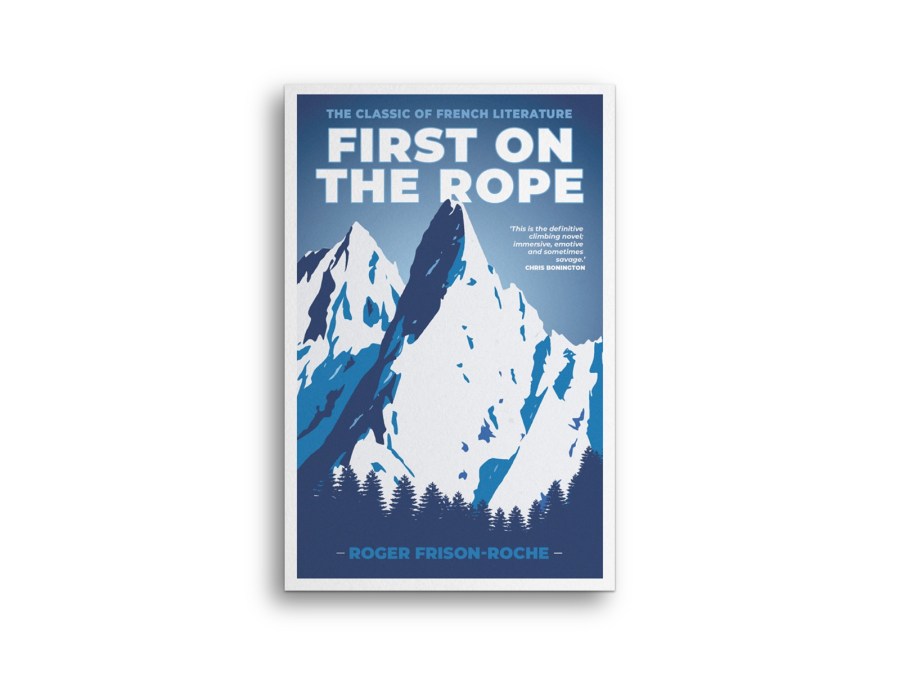“With positive anguish the men below followed this crazy struggle between the two guides and the mountain. They watched in absolute silence, and with desperate anxiety, only too aware of their own powerlessness to help.”
First on the Rope is the acclaimed English translation of the French mountain fiction classic by Roger Frison-Roche, now available from Vertebrate Publishing. It’s a tale about the harsh lives of mountain guides and their families in the French Alps in the 1920s and 1930s.
This is an extract from Chapter XVIII, depicting a desperate, ice-glazed ascent.
Jacques Batioret set to work on the first chimney. From below, Maxime and Red Joseph could see him gain height slowly, dislodging the snow with his body, hacking away with his axe at the lumps that hindered his progress. It was gruelling work, but he did not take long to reach the top.
Soon after Boule took over the lead; then Fernand relieved him, then Camille. Michel was the only one not to take a turn.
‘Keep back, Michel,’ ordered Boule, ‘you’re too young to lead; you’re lucky to be here with us at all.’
Red Joseph and Maxime slung on their sacks, stood up in the snow, and craned their necks to follow their young friends’ progress on this particularly tricky ascent.
The three parties went up at a good pace. It certainly looked like a fairly normal climb; but, in fact, it was extremely dangerous, and it was only the climbers’ skill and training that made it appear easy.
Ravanat was reassured by what he saw, and gave the word to be off.
‘Let’s get going, Maxime, while the snow’s still good.’
They set off slowly down the couloir, Maxime coming last, and kept on looking back half regretfully to see how the climbers were getting on. They had reached a point high up in the great wall when a rocky rib finally hid them from view.
There was no truce, up there, in the pitched battle with the mountain. The higher they climbed the greater the difficulties they encountered. Luckily the warm breath of the föhn wind softened the snow and enabled them to get warm when halting for a moment on a stance between two difficult pitches. Then off they would start again on the same old round – clearing the cracks, fighting their way up, with now and then a spell of cutting hand- and footholds in hard ice.
‘Call this a rock climb,’ muttered Boule, ‘you’d think this was a winter ascent!’
‘We’ve seen nothing yet,’ cursed Jacques, ‘it’s only just beginning. Did you ever in all your born days see such awful conditions as these?’
They reached the foot of a wide, high chimney; the sight of all the ice in it made them hesitate. Pierre, who was warming to the struggle, wanted to go up first, but Boule waved him back. ‘Stay where you are – it’s my turn.’
What Boule did not say was that this pitch was too dangerous for Pierre to be allowed to lead. So up he started himself. He made slow progress, and sometimes he did not seem to be mounting at all. Little by little, however, he gained height. Carefully he tested every hold, calculating each slightest movement and avoiding any unnecessary effort. He kept up a sort of running commentary, audible to the men below.
‘ … some verglas, this, my boy … here we are, no more hold … hang on, Boule, hang on … good God, man what a sweat.’
Halfway up he was brought to a stop by an icy bulge. Still looking upwards, he yelled out:
”Fraid this looks pretty hopeless. However, send me up the hammer; if I can make a few nicks … ‘
‘Hold on a second,’ shouted back Fernand, ‘I’m coming up.’
Fernand clipped the hammer, two mousquetons and a piton on to his belt, and in his turn started up the chimney. In spite of Boule’s good work in clearing it of snow and ice, he found the going terribly hard. As he climbed, he gave vent to his admiration.
‘How on earth did you get up? Confound you, Boule, with that everlasting grin of yours! My God,’ he yelled, with his body half jammed in the angle, ‘there just isn’t a single hold – there’s ice in everything. Make sure that rope’s well belayed, you down there – it’s—’
‘Come down, you idiots,’ bawled Paul Mouny.
‘Come down this minute,’ ordered Jacques Batioret, ‘it’s not good enough … You’ll only break your necks by going on.’
Boule was still laughing, up there under the overhang, but now there was a note of apprehension in his mirth. With one arm and one knee jammed in the angle, he was tiring visibly: his eyes were on Fernand climbing upwards. But neither of them was in a position to help the other.
‘Hurry up, Fernand, if you possibly can – I’ve got cramp,’ Boule gasped, for his friend’s ear only.
‘Hold on just a second, I’m coming.’
Boule felt his fingers slowly losing their grip, and his muscles were stiff with cramp.
‘Come on, quick,’ he begged.
With positive anguish the men below followed this crazy struggle between the two guides and the mountain. They watched in absolute silence, and with desperate anxiety, only too aware of their own powerlessness to help.
‘It’s absolutely crazy. How in the name of God did you get up there,’ gasped Fernand. ‘I thought I could climb pretty well, but I’d never in a million years have managed to get up.’
‘Shut up, and keep your breath.’
With a final effort Fernand heaved himself up till he was just below Boule’s feet. It was high time, too.
‘Wedge yourself in, quick,’ snapped Boule. ‘It’s only for a second, but – I’ve got cramp in my arm, I must shift my position or I’ll let go.’
Fernand wedged himself in the crack and was able to take some of Boule’s weight on his shoulders. The latter gave a great sigh of relief; the strain faded from his face; once again, he radiated cheerfulness. Danger and exposure were all forgotten and his one thought now was to hurry on.
‘If you hadn’t made that stretch,’ he chuckled, ‘I’d have come right off, sure as death. Hand up that hammer and a piton.’
Very slowly and carefully, so as not to disturb the balance of the human pyramid, Fernand passed the tools up.
‘You’ve got to support me till I get this piton knocked in,’ Boule instructed.
‘Right, go ahead.’ Up on their fantastic perch they talked to each other as nonchalantly as if they had been sitting in two armchairs. Boule rested for a moment on Fernand’s shoulders. The big tricouni nails dug painfully into Fernand’s flesh; but he bore the weight without flinching. Although the veins in his neck swelled visibly under the strain, he gave no sign of it except to whisper, so that the others couldn’t notice anything:
‘Be as quick as you can, Boule – you’re heavy.’
Using one hand, Boule placed the piton in a tiny crevice, then hammered it right in up to its head. Then he fastened one of the snap-links to the ring, and passed his climbing rope through.
‘Give us a bit more rope,’ he ordered the men below.
He was now safeguarded.
Fernand hauled in – first with one hand, then with his teeth – a few feet of rope, and handed the slack up to Boule, who duly safeguarded him by passing it through the snap-link. They both let out a sigh of relief. From below Paul Mouny and Jacques Batioret, appalled by the fearful struggle taking place before their eyes, set up a shout.
‘Give it up for God’s sake and come down. It’s too risky.’
Pierre Servettaz was watching the proceedings in a fever, and he could not help showing what was in his mind by yelling:
‘Can you make it?’
‘We’ll have a shot at it.’
First on the Rope by Roger Frison-Roche is published by Vertebrate Publishing (paperback, £8.99)








